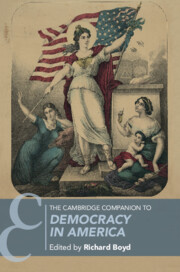Book contents
- The Cambridge Companion to Democracy in America
- Series page
- The Cambridge Companion to Democracy in America
- Copyright page
- Contents
- Contributors
- Acknowledgments
- Chronology
- Abbreviations of Tocqueville’s Major Works
- Introduction
- Part I Sources and Contexts
- Part II Receptions and Applications
- Part III Genres and Themes
- Part IV Democracy’s Enduring Challenges
- 14 Tocqueville’s American Girls
- 15 Picturing American Democracy
- 16 Democracy in America in the Twenty-First Century
- References
- Index
- Series page
16 - Democracy in America in the Twenty-First Century
New Challenges of Diversity and Inequality
from Part IV - Democracy’s Enduring Challenges
Published online by Cambridge University Press: 23 March 2022
- The Cambridge Companion to Democracy in America
- Series page
- The Cambridge Companion to Democracy in America
- Copyright page
- Contents
- Contributors
- Acknowledgments
- Chronology
- Abbreviations of Tocqueville’s Major Works
- Introduction
- Part I Sources and Contexts
- Part II Receptions and Applications
- Part III Genres and Themes
- Part IV Democracy’s Enduring Challenges
- 14 Tocqueville’s American Girls
- 15 Picturing American Democracy
- 16 Democracy in America in the Twenty-First Century
- References
- Index
- Series page
Summary
One of the central themes of Democracy in America is the dawning tide of democratic equality. In Tocqueville’s view, this equality – understood as uniformity – represents the future of modern democratic society. Rogers M. Smith argues in this chapter that, even though Tocqueville’s assessment of America as a world of democratic equality may be unreliable, his reckoning with these issues nonetheless proves instructive for how we confront challenges of diversity and inequality. Tocqueville’s worries concerned excessive equality and uniformity, but today’s dilemmas increasingly involve inequality and differential treatment. Rather than treating everyone equally, in what Smith calls a “post-Tocquevillean America,” we confront the challenge of trying to secure diversity and equity by differential treatment of some groups. Smith argues that we ought to be prepared to offer special accommodations and differential treatment for groups so long as these do not substantially harm the civil rights of others and are consistent with the broader ends of substantive equality. Although Tocqueville’s vision of the challenges of democracy may diverge from our own, his thoughts remain illuminating of contemporary challenges of diversity and inequality.
Keywords
- Type
- Chapter
- Information
- The Cambridge Companion to Democracy in America , pp. 409 - 431Publisher: Cambridge University PressPrint publication year: 2022



